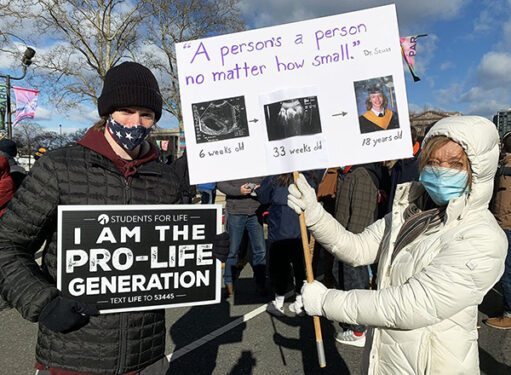
By Gina Christian
PHILADELPHIA (CNS) — As the nation marks nearly five decades of legalized abortion, Philadelphia area pro-life advocates say they’re committed to “all-encompassing” support for human dignity, from conception to natural death.
“What you say at the beginning of life, you say at the end of life,” said Steven Bozza, bioethicist and director of the archdiocesan Office for Life and Family. “The question is, ‘How are we being pro-life with all of the stages of life?'”
The answer involves a broad array of public witness, legislative change, social outreach, scientific advancement and education — all inspired by faith, love and courage, Bozza told CatholicPhilly.com, the news website of the Archdiocese of Philadelphia.
“Catholic social teaching reveals a beautifully consistent ethic of life,” he said.
Upholding that ethic first requires a recognition that abortion ultimately devalues human life at every age, Bozza explained.
“Think of the social problems we see in the news every day, violence, people killing each other. It boils down to a disrespect for human life. You’re not respecting human life in the womb. What makes you think you’ll respect it on the street?” he said.
Since the 1973 U.S. Supreme Court rulings on the Roe v. Wade and Doe v. Bolton cases, more than 61 million abortions have taken place in the country, an average of 2,000 per day.
Globally, about 73.3 million abortions are carried out annually, according to the Guttmacher Institute, which conducts research on abortion and reproductive health. The number is 5 million greater than United Kingdom’s population, and nearly 15 million more than the total number of deaths worldwide in a given year, as recorded by the United Nations.
Abortion particularly impacts communities of color: Blacks, Hispanics and other non-whites accounted for 62% of all U.S. abortions in 2014, according to Guttmacher.
On Jan. 21, Bozza will join thousands expected at the 49th annual March for Life in Washington, which returns as an in-person event this year. Last year’s observance took place online because of the coronavirus pandemic.
Pro-life supporters from parishes, schools and Knights of Columbus councils also will join the march. Those not making the trip to the nation’s capital are expected to participate in other events in the Philadelphia Archdiocese including special Masses and online prayer services.
Beyond the march, across the archdiocese, a wide range of pregnancy and parenting supports offer tangible help and hope to women in crisis pregnancies, giving them alternatives to abortion, pro-life advocates said. They held up the archdiocesan Catholic Social Services and the outreach efforts of the Pro-Life Union of Greater Philadelphia as prime examples of the work being done.
“The pro-life community of Greater Philadelphia is doing amazing things. I hope others join these efforts for the good of the human family,” said Father Christopher Walsh, pastor of St. Raymond of Peñafort Parish in Philadelphia and chairman of Pro-Life Union.
Still, amid the continuing efforts to end abortion, challenges remain.
The Supreme Court’s pending ruling in the Dobbs v. Jackson Women’s Health Organization case may overturn Roe v. Wade and redirect the abortion issue to the state level for regulation.
Such a decision would turn pro-life advocates’ attention to the states, Father Walsh said.
States such as New Jersey have already moved “to enshrine a ‘right to abortion’ in their law,” said Father Walsh, noting “there are plans to do the same in Pennsylvania.”
For that reason, he explained “it is essential for people who believe in the civil rights of the unborn child to be united.”
In “(fighting) this legal battle,” he said, “the more challenging battle for hearts and minds must continue.”
Father Walsh urged compassion in “listening to those who believe abortion is permissible,” and advised pro-life advocates to “share the truth with (abortion proponents) little by little, with patience but also with conviction.”
Bozza, meanwhile, invited men to take a greater role in that conversation.
“I put much of this issue squarely into the hands of the men involved,” he said, citing St. Paul VI’s 1968 encyclical “Humanae Vitae” (“Of Human Life”), which said artificial contraception and abortion would result in a woman being reduced to “a mere instrument for the satisfaction of (a man’s) desires” without regard for “the reverence due to (her).”
Pro-Life Union president and CEO Tom Stevens agreed, describing abortion as “an easy way out for men.”
At the same time, many men are simply excluded “when there’s an unexpected pregnancy,” and a decision to seek an abortion “can cause great grief for a man,” Stevens said.
Both he and Bozza said chemical abortions, for which pills are widely available, compound that marginalization while endangering the health of women and teenage girls.
“A doctor or a nurse practitioner could be talking to a 14-year-old girl in her bedroom, and there’s no ultrasound, so you don’t really know how far along she is, or if she has an ectopic pregnancy. It’s really dangerous,” Stevens said.
“What happens when things go wrong, and she ends up in the hospital?” Bozza asked, noting that medical advances are paving the way to end abortion.
Through the work of organizations such as Students for Life of America and Live Action, younger generations have the needed scientific information to “debunk the social myths” surrounding abortion, said Maria Parker, theology department chair at Cardinal O’Hara High School in Springfield, Pennsylvania, near Philadelphia.
“I think most of our students are definitely pro-life” she said, “and they just need the knowledge and information so they can connect what they’re feeling in their hearts with their heads.”
